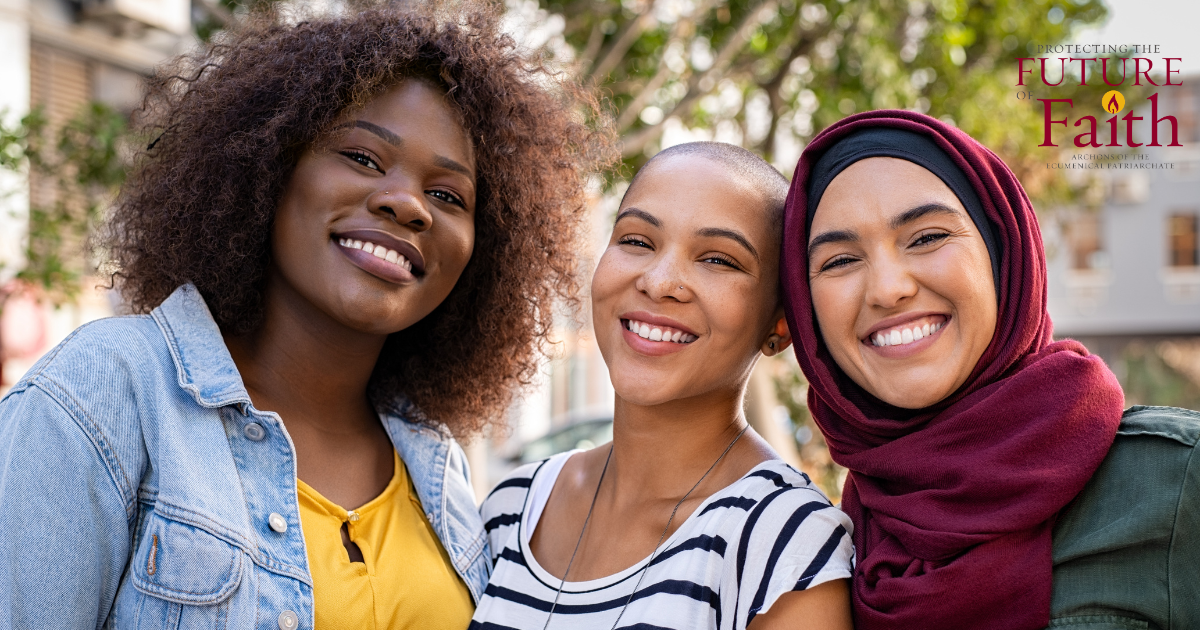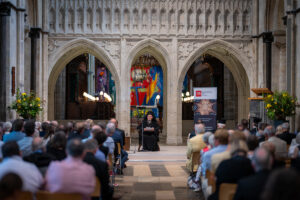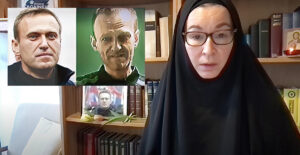“For as many of you as were baptized into Christ have put on Christ,” says Saint Paul. “There is neither Jew nor Greek, there is neither slave nor free, there is neither male nor female; for you are all one in Christ Jesus.” (Galatians 3:28) The Myrrh-Bearing Women, whom the Orthodox Church celebrates on the second Sunday following Pascha, were the first to discover Jesus’ tomb empty, and that He had risen from the grave, just as He said (Mark 16:1-8).
The Qur’an says that God created men and women “from a single soul” (4:1), and that “the believers, men and women, are protecting friends of one another” (9:71). The Talmud states: “Greater is the reward to be given by God to the righteous women than to righteous men,” “women have greater faith than men,” and “women have greater powers of discernment.” The Vedas, ancient scriptures that form the basis of Hinduism, Buddhism, and Jainism, esteem women highly and refer to them as dharma Patni, those who support and protect rightful conduct.
His All-Holiness Ecumenical Patriarch Bartholomew has corrected the notion that Orthodox Christianity is misogynistic or devalues the vital contributions of women: “The Orthodox Church is unfortunately and misguidedly deemed as male-centered. However, the central position of the Virgin Mary in the Church life, the plethora of holy women, the contribution of women to the parish, and the essential role they play in the family, which are some admirable facts, prove these views wrong. The Metropolitan of Pergamon very aptly stresses that women are the pre-eminent expression of the person-centered morality in Orthodox tradition. He writes: ‘Women, more than anyone else, and perhaps, first and foremost, as Mothers, teach us to live as persons, not as individuals, that is, as beings in a relationship, not as autonomous and independent beings.’”
Pope Francis would wholeheartedly agree. He has reminded us that the world “needs to look to mothers and to women in order to find peace, to emerge from the spiral of violence and hatred, and once more see things with genuinely human eyes and hearts.” The pontiff called upon the nations of the world to “accept the gift that is woman, every woman” and to “respect, defend and esteem woman in the knowledge that whoever harms a single woman profanes God, who was born of a woman.”
Sadly, statements of this kind need to be made even in our age because of ongoing tendencies to discount the role and importance of women in faith communities. Although these communities should be blazing the trail for the wider society in the acceptance of gender equality and inclusion, unfortunately the reality has all too often been the opposite, as ancient prejudices and unexamined assumptions have all too often held people of faith back from recognizing the value and equality of women, and from seeing and acknowledging the indispensable role of women in creating a human community that recognizes the centrality of faith and ensures that the light of faith is passed on to future generations.
In our own age, however, that is changing. Women have assumed positions of leadership in the political and academic worlds, as well as in the media and indeed among people of faith from all traditions. Their leadership has come to be generally accepted and not subject to the stereotypes and false beliefs of the past. Yet there is still a great deal more that must be done. People of faith need to recognize the role of women in their own religious traditions, and become the exponents in our day of the importance of securing that the rights and dignity of women everywhere are respected. It is from our own faith traditions that we will draw the spiritual resources we can and must use in order to do this. While many people, as His All-Holiness noted, have assumed that faith traditions intrinsically devalue and denigrate women, the affirmations of female dignity and value are found in those traditions as well; people of faith must discover those affirmations and make them more widely known, not just among people in their own faith communities, but among all people of the world.
Doing this will bring immense blessings to the communities of faith that dare to speak out and act upon their tradition’s affirmation of the feminine. They will receive the blessings of women’s full participation in their communities. Those communities will realize what it means to be fully human and totally engaged with the divine, for it is only by affirming humanity in both its female and male dimensions can human beings truly experience the fullness of faith. This is a goal for which all faith communities should strive.







